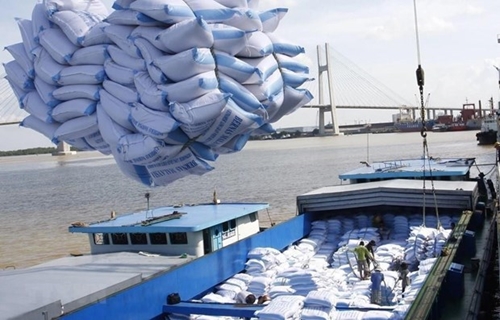According to figures from Vietnam Customs, Vietnam earned 192 million USD from shipping nearly 348,000 tonnes of rice overseas in January, down 34.2 percent in value and 36.4 percent in volume against December and 2.4 percent and 15.4 percent, respectively, year-on-year.
    |
 |
|
Loading rice for exports at Sai Gon port. (Photo for illustration) |
As the Lunar New Year (Tet) holiday fell in February, the month’s export turnover is expected to be down.
Nguyen Van Don, Director of Tien Giang province’s Viet Hung Limited Company, said the beginning of the year is never the peak time for trade, as consumers have already purchased rice for the long holiday period at the end of the previous year. Rice prices in the Mekong Delta are also at a high level, so purchasing businesses and foreign customers are all waiting for them to fall.
General Director of the Trung An Hi-tech Farming JSC Pham Thai Binh said that transportation problems have also hampered rice exports in recent times. He pointed out that the country is facing a serious shortage of empty containers and cargo ships for exports.
According to the Vietnam Food Association (VFA), there are high hopes being pinned on Vietnam’s rice exports in 2021, with major export markets such as the Philippines and Africa continuing to sign contracts, while many others have significant demand for fragrant rice and sticky rice, in which Vietnamese enterprises hold an advantage.
VFA Vice President and General Secretary Nguyen Trung Kien said that bilateral and multilateral free trade agreements (FTAs) such as the EU-Vietnam FTA and the UK-Vietnam FTA, which contain preferential tariffs, will create favourable conditions for Vietnamese rice to compete with foreign exporters.
Eurasian Economic Union (EAEU) countries have pledged to provide a tariff quota of 10,000 tonnes of rice from Vietnam in 2021 under the Vietnam-EAEU FTA, while the EU’s quota of fragrant rice from Vietnam is 80,000 tonnes each year under the EVFTA.
The UK-Vietnam FTA, which came into effect at the beginning of this year, cuts tariffs to zero and has no quotas.
Binh said that rice exports this year will not only sustain the value growth seen in 2020 but also increase in volume.
Saying there are reasons for optimism, he noted that the country’s policy of intensive and extensive integration into the world has created a number of competitive edges for its economy via multilateral and bilateral FTAs.
Under the integration policy, Binh said, the rice sector has gradually restructured itself towards higher quality rather than primarily focusing on output, and is growing more diverse varieties, with high-grade grains meeting demand among both domestic and foreign consumers.
Vietnam exported 6.15 million tonnes of rice worth 3.07 billion USD in 2020, down 3.5 percent in volume but up 9.3 percent in value against 2019, according to the Ministry of Agriculture and Rural Development.
Source: VNA